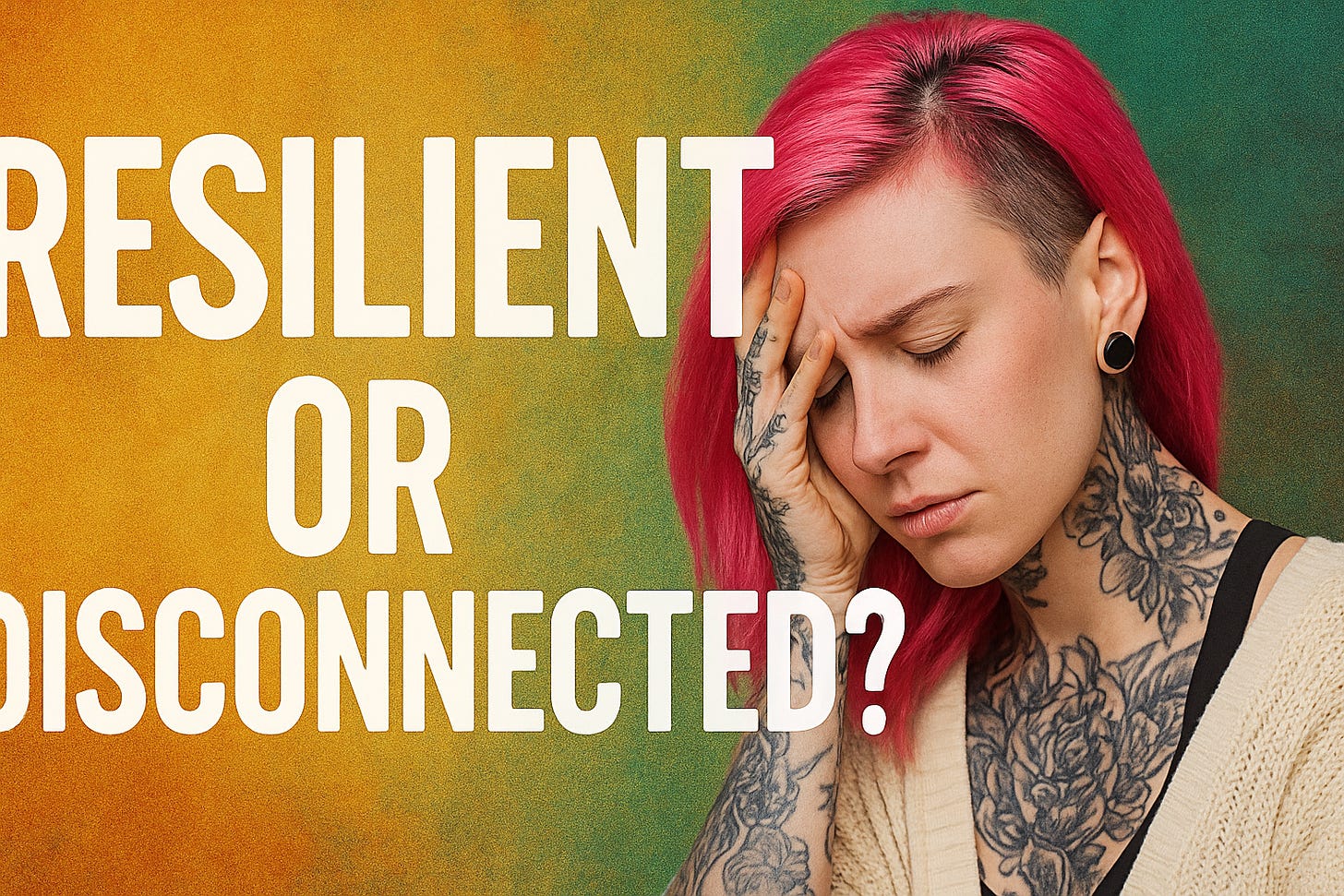Real Resilience Isn’t Robot Mode
How to stop mistaking composure for resilience—and build true emotional strength.
🎙 Subscribe if you want to keep truth spoken, not silenced.
A Quote That Hit Me Like a Freight Train…
esiliency is how quickly you can return to baseline.” — Leila Hormozi
Excuse me, what?
If that’s resilience, I’m not resilient. Not even close.
I just look like I am. Calm. Collected. Easygoing. The person you’d want next to you in a fire drill. You ever feel like that, outwardly fine but secretly spiraling? Yeah, me too.
Except when life throws the tiniest curveball, cancelled plans, a printer jam, or God forbid, someone asking me “What’s for dinner?”, my body reacts like it’s DEFCON 1.
Outside? Poker face. Inside? A squirrel on bath salts sprinting across a burning tightrope.
That’s not regulation. That’s theatre.
That’s survival with stage makeup.
According to the American Psychological Association, resilience isn’t about staying calm at all, it’s about adapting well in the face of adversity and stress, and being flexible enough to return to balance after disruption.¹ Researchers like Bonanno (2004) have shown that resilience is not suppression, but recovery speed and emotional flexibility.²
I Used to Think He Was Strong
Let’s call him Chad.
Ex-military. Stoic. Controlled. Cool in a crisis. If the car broke down, he fixed it. If we got pulled over, he handled it. No panic. No paralysis. Just action. You know the type.
Meanwhile, I’d have been the one ugly crying into the cupholder while he’s casually tightening a bolt with one hand and sparking a Marlboro with the other.
I thought that was resilience.
Plot twist: Chad wasn’t resilient.
Chad was a narcissistic psychopath.
Chad’s “Feelings” (If You Can Call Them That)
To be fair, he did emote. Sort of. I saw flashes of rage, jealousy, and envy, like a toddler who’d stolen a thesaurus.
One night, he broke down about a girl. Sobbed. Ranted. Looked so heartbroken. And for a second, I thought, wow. Depth.
Wrong. That wasn’t heartbreak. That was narcissistic collapse, a well-documented reaction when fragile self-image is threatened, described by Kohut (1972) and Kernberg (1975).³ More recent research links narcissism to shallow affect and emotional manipulation, rather than genuine depth.⁴
And I was the audience. His tears weren’t about vulnerability. They were emotional theater, planting seeds of guilt and leverage for later.
Think Broadway, but the tickets cost your sanity. Sound familiar?
Emotional Depth vs. Emotional Leverage
If you’ve only ever known relationships that felt one-sided, let me clear this up:
Emotional depth is:
Feeling something for another person, not just in their presence
Letting their emotions land without trying to hijack or “fix” them
Wanting connection more than control
Being changed by the exchange
Emotional leverage is:
Just enough tears to make you panic
Silence, anger, or charm, rolled out like props in a play
Feeling through others, not with them
Using emotions as tools, not truths
Chad’s feelings had shape but no substance. Like CGI water in a low-budget movie, you see the splash, but nothing’s actually wet.
Resilience vs. Dissociation
Here’s me:
I can go from sobbing to stone-faced in 2.5 seconds flat.
It’s like emotional Houdini. One minute, I’m weeping. The next? Dry eyes, steady tone, functional human being.
That’s not strength. That’s dissociation, the nervous system equivalent of shoving emotions into a closet so densely packed it’s basically a black hole.
Bessel van der Kolk describes in The Body Keeps the Score how trauma responses override emotional processing, cutting us off from completing the cycle.⁵ Neuroscience research also shows dissociation is tied to amygdala over-activation and prefrontal shutdown.⁶
I learned early that emotions were unsafe. Too much. Too loud. Too needy. If I didn’t shut them down, they’d drive people away, or worse, drown me.
So I adapted. I turned it off.
Fast.
That’s not resilience. That’s surviving your own sensitivity in a world allergic to it. Can you relate?
Real Resilience
Resilience isn’t gritting your teeth until your jaw breaks. It’s not envying the cold-hearted and thinking that’s strength.
Real resilience is:
Feeling fully, even when it’s messy
Letting your nervous system finish its loop instead of pulling the emergency brake
Returning to yourself without shame
Tugade & Fredrickson (2004) found that positive emotions actually aid resilience by broadening our capacity to cope.⁷ More recent research highlights that emotional flexibility, not rigidity, is the hallmark of resilience.⁸
It’s staying present through the wave and trusting you won’t die in it. It’s messy. Inconvenient. Human.
What I Know Now
You don’t build resilience by studying robots in human skin and calling it “strength.”
You build it by refusing to ghost yourself. By standing in your own storm and realizing, holy shit, I can actually handle this.
Chad had composure. I’m building capacity. And that makes me more powerful than I ever looked on the outside.
So if you’ve ever admired someone cold, distant, and detached, thinking they had what you lacked, take a second look.
It might not be strength. It might just be emotional bankruptcy dressed as security.
And You?
You’re not broken for feeling.
You’re strong enough now to admit it, feel it, process it, and integrate it.
That’s not weakness. That’s your superpower. Ever been there?
In truth & integrity,
Jacie
🎙️
SoulCraft™ LIVE
We meet the 1st of every month @ 8 p.m. ET | 90 minutes
New theme monthly: practical integration work, guided hypnosis, and a live Q&A.
Designed to align your mind, will, and emotions.
🧠
Work With Me
SoulCraft™ is my signature coaching method.
It’s the craft of harmonizing your mind, will and emotions, and the practice of integrating the fragmented parts of yourself through the art of hypnosis.
Align your inner world and watch your outer world transform.
🎁
FREE Gift
Step inside the “Museum of the Mind” with my free hypnosis audio.
Sent directly to your inbox when you subscribe.
🎬🔒Video Vault
Unlock the Full Story Below ⬇︁


